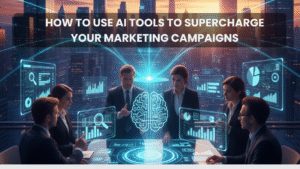Artificial Intelligence (AI) is no longer just a buzzword—it’s a powerful tool that’s transforming how businesses do content marketing. From writing blog posts to analyzing user behavior, AI tools are helping marketers save time, improve efficiency, and boost engagement.
Why does this matter? Because in today’s digital world, customers expect faster, smarter, and more personalized experiences. With so much content being created daily, businesses need smarter strategies to stand out. That’s where AI in content marketing comes in.
Whether you’re a small business or a global brand, using AI in your content marketing can help you scale your efforts while maintaining quality. In this blog, we’ll explore the benefits, challenges, and practical ways you can use AI to improve your content strategy.
Benefits of AI in Content Marketing
Enhanced Efficiency & Automation with AI Tools
AI tools make content marketing much quicker and easier by handling many time-consuming tasks. Instead of spending hours writing blog posts, creating emails, or planning social media content, AI can help you get it all done in minutes.
With AI content generators like Jasper or Copy.ai, you can create high-quality blog posts, social media captions, product descriptions, and emails with just a few clicks. These tools can even suggest better wording, grammar improvements, or catchy headlines.
You can also use platforms like Buffer or Hootsuite to schedule your social media posts in advance. It means your content can be posted automatically at the best times, even while you’re asleep or busy.
Email marketing tools powered by AI can figure out the best time to send emails to each person, helping improve open and click rates.
Example: A marketer can use AI to write a weekly newsletter, personalize it for different readers, and schedule it—all in under an hour.
Personalization at Scale for Better User Engagement
Personalization means giving each user content that feels made just for them—and AI makes this possible, even for thousands of users at once. It looks at what people click, watch, or buy and uses that data to offer content they’re more likely to enjoy.
AI helps by showing different emails, product suggestions, or website layouts based on each person’s interests and past behavior. For example, someone who loves tech might see gadget blogs, while someone interested in fashion sees clothing deals.
Example: Amazon’s homepage shows you products based on your browsing and buying history—that’s AI-driven personalization in action.
Data-Driven Insights for Better Content Strategy
AI gives you smart insights by quickly analyzing large amounts of data. It helps you see what content your audience likes, what they skip, and how they behave on your website or social media.
With AI-powered analytics, you can find out which blog topics, headlines, or content formats work best. It also helps you spot patterns—like the best time to post or which pages get the most visits. It allows you to make smarter decisions and improve your content strategy instantly.
Example: If a blog isn’t performing well, AI might suggest changing the headline or keywords to attract more clicks.
AI for SEO Optimization: Boosting Organic Traffic
AI tools are powerful helpers for improving your website’s visibility on search engines like Google. They make SEO easier by suggesting the right keywords, analyzing what your competitors are doing, and helping you write better, search-friendly content.
These tools also help with rank tracking, on-page SEO, and building strong backlink strategies. AI even improves voice search optimization by understanding how people answer their questions.
Popular AI SEO tools include Surfer SEO, Clearscope, SEMrush, and Frase.
Example: AI tools can recommend the best keywords, headings, and blog structure to boost your Google rankings and bring more organic traffic to your website.
Streamlining Content Creation & Curation
AI makes both creating and finding content faster and easier. It can write blog posts, social media captions, product descriptions, and more—saving you hours of work. Along with writing, AI also helps you curate content, which means collecting useful and trending articles from across the internet.
Tools like Feedly or Pocket find the latest news and popular posts in your niche. It keeps your audience engaged without needing to search manually every day.
Example: A social media manager can use AI to create daily posts quickly and share top industry updates, keeping the content fresh and relevant with little effort.
Challenges of Using AI in Content Marketing
While AI offers many benefits, it’s not perfect. Let’s look at the key challenges marketers face when using AI in content.
Ensuring Content Quality in AI-Generated Pieces
While AI is great for saving time, its content can sometimes feel dull, robotic, or too general. It may repeat ideas, include outdated facts, or miss the unique voice of your brand.
That’s why it’s important to always review and edit AI-generated content. A human touch adds emotion, creativity, and personality that AI can’t fully match. You can improve quality by adding real experiences, opinions, and brand tone.
Solution: Use AI as a helper, not a full replacement. Let it handle the basics, then let your team refine the message to make it feel more human and engaging.
Addressing Data Privacy Concerns in AI Marketing
AI in marketing depends on user data to create personalized content and improve user experience. However, this raises important privacy and security concerns that businesses must address.
Challenges include collecting and storing data safely, following legal rules like GDPR and CCPA, and making sure users trust how their data is used.
To stay safe and SEO-friendly, marketers should be transparent about data collection, explain how the data is used, and use secure tools. Also, giving users control over their privacy settings builds trust and keeps your marketing practices ethical and compliant with data laws.
Overcoming High Costs of AI Marketing Tools
AI marketing tools can offer great benefits, but the cost can be a challenge for small businesses and startups. Many tools require a high initial investment and ongoing monthly fees for access to premium features. Plus, there’s often a learning curve that takes time to master.
To save money, start with free or low-cost AI tools like Grammarly, ChatGPT, or Canva AI. These tools are user-friendly and help improve your content without large expenses. Look for tools that provide clear value and ROI. Scale your use slowly—automate only what’s needed and expand as your business grows and sees results.
Data Dependency: Addressing AI’s Data Needs
AI works best when it has access to clean, fresh, and diverse data. If the data is outdated, incorrect, or biased, the AI may produce low-quality content or give wrong suggestions. It can hurt your brand and lead to poor targeting.
Risks include AI learning from bad sources, generating biased or unfair content, and targeting the wrong audience with your marketing efforts.
Transform Your Digital Presence
Get personalized strategies and solutions tailored to your business needs.
- Free Initial Consultation
- Custom Solution Planning
- Expert Team Support
To fix this, regularly clean and update your data, and make sure it comes from multiple reliable sources. Always review AI outputs to check for mistakes or bias. Quality data leads
to better, more accurate AI-driven marketing.
Technological Integration: Adapting AI to Existing Systems
Adding AI tools to your current marketing systems, like CRM or CMS, can be difficult, especially if your software is outdated or your team lacks technical skills. Common challenges include compatibility issues, limited in-house expertise, and the need for proper staff training.
To make integration easier, choose AI tools that are compatible with your existing platforms. Many modern tools offer plug-and-play options or API support for smooth setup. Work with your IT team or hire experts if needed. Also, train your marketing staff to use these tools effectively to boost performance and get the most out of your AI investment.
How to Use AI in Content Marketing
Now that we know the pros and cons, let’s explore how to use AI to get real results from your content marketing.
Choosing the Right AI Tools for Content Marketing
Selecting the right AI tools for content marketing can boost your efficiency and results. Start by identifying tools that align with your goals, whether it’s creating engaging blogs, crafting social media posts, or improving SEO.
Top AI Tools for Content Marketing
- Jasper: A versatile AI writing assistant that helps create blogs, ad copy, and social media content quickly.
- Copy.ai: Perfect for generating short, catchy content for emails, social posts, and ads in minutes.
- Grammarly: An AI-powered tool that refines your writing by improving grammar, clarity, and tone.
- Surfer SEO: Analyzes top-ranking pages to optimize your content for better Google rankings.
- HubSpot: Combines AI-driven content tools with CRM to streamline marketing and track performance.
What to Look for in AI Tools
Choose user-friendly tools to save time and effort. Ensure they integrate seamlessly with platforms like WordPress, social media, or email marketing software. Strong customer support is key for quick issue resolution. Look for tools offering real-time analytics to track performance and make data-driven decisions. Scalability is also important—pick tools that grow with your business. By selecting the right AI tools, you can create high-quality, SEO-optimized content that engages your audience and drives traffic.
Implementing AI for Content Creation and Optimization
Using AI for content creation and optimization can save time and improve your marketing efforts. By following a few simple steps, you can create high-quality, SEO-friendly content that connects with your audience.
Steps to Implement AI in Content Creation
- Generate Content Ideas: Use AI tools like Jasper or Copy.ai to brainstorm ideas based on trending topics and keywords. These tools analyze popular content to suggest relevant topics that resonate with your audience.
- Create First Drafts: Let AI writing tools like Jasper or Copy.ai draft blogs, social media posts, or emails quickly. They produce content fast, giving you a solid starting point.
- Optimize for SEO: Tools like Surfer SEO or Clearscope analyze top-ranking pages to optimize your content. They suggest keywords, headings, and structure to boost your Google rankings.
- Edit and Humanize: Always review AI-generated content. Edit it to match your brand’s voice and tone. Adding a human touch ensures authenticity and builds trust with your audience.
- Pro Tip: Don’t depend only on AI. Human creativity and oversight are crucial for quality and relatability. By combining AI efficiency with human insight, you’ll create engaging, optimized content that drives traffic and conversions.
Enhancing Audience Personalization with AI
AI makes it easy to deliver the right message to the right person at the perfect time, boosting engagement and conversions. By using AI tools, you can create personalized experiences that make your audience feel valued.
How to Personalize with AI
- Segment Your Audience: Use AI-powered CRM tools like HubSpot or Salesforce to group your audience based on their interests, behaviors, or demographics. It ensures your content reaches the right people.
- Create Personalized Content: AI tools like Jasper or Copy.ai can craft tailored emails, social posts, or offers that match each segment’s preferences. For example, you can send unique discount codes to loyal customers.
- Analyze Behavior: AI analyzes user data, such as clicks or purchases, to understand what your audience likes. Tools like Google Analytics or Hotjar provide insights to refine future campaigns.
Example: An eCommerce store can use AI to recommend products based on a customer’s browsing history, like suggesting sneakers to someone who viewed running gear. It increases the chances of a sale.
AI for Effective SEO and Content Optimization
AI plays a big role in improving how your content ranks on search engines like Google. It helps you create smarter, more optimized content that attracts more visitors and drives organic traffic to your website.
With AI SEO tools like SEMrush, Frase, or Surfer SEO, you can easily find the best keywords to target in your blog posts, product pages, or social media content. These tools analyze what users are searching for and help you include those keywords naturally in your writing.
AI also helps improve your content layout, headlines, and structure. It can suggest better headings, paragraph breaks, and even the ideal word count to boost readability and SEO performance.
One of the major benefits of using AI is that it lets you track performance in real-time. You can see which pages are doing well and which ones need improvement. Based on this data, AI gives you suggestions to update your content for better results.
Bonus Tip: Use AI to optimize for voice search by using conversational language and answering common questions directly—this helps your content appear in featured snippets and voice results.
Using AI Analytics to Optimize Content Strategy
AI analytics can transform your content strategy by showing you what works and what doesn’t. By tracking performance and providing clear insights, AI helps you create better content that resonates with your audience.
Steps to Use AI Analytics
- Set Up AI Analytics Tools: Use tools like HubSpot, Google Analytics, or SEMrush with AI features to monitor your content’s performance. These tools are easy to set up and provide detailed data.
- Track Key Metrics: Focus on metrics like click-through rate (CTR), bounce rate, time on page, and conversions. AI analyzes these to reveal how users interact with your content.
- Use Insights to Improve: AI tools highlight trends, such as which topics or formats get more engagement. Use these insights to tweak your content, like creating more posts on popular subjects or adjusting headlines for better clicks.
Example: If AI analytics show that blog posts about “sustainable living” have higher engagement, prioritize similar topics in your next content batch to boost traffic.
The Future of AI in Content Marketing
The future of AI in content marketing looks very promising. As technology grows, AI tools will become even smarter, faster, and more creative, changing the way businesses create and share content.
Smarter AI Tools
AI tools are improving every day. In the near future, they will become more accurate in understanding language, tone, and context. It means AI will be able to create content that sounds more natural and human-like, making it harder to tell if a person or a machine wrote it. These tools will also become easier to use, helping even non-technical marketers produce high-quality content quickly.
Voice AI & Conversational Content
Voice search is growing fast. More people now use voice assistants like Siri, Alexa, and Google Assistant to search the web. In response, AI will help marketers optimize content for voice queries, which are often longer and more conversational than typed searches.
Trend: Marketers need to focus on using natural language and answering questions clearly to perform well in voice search results. It is a key part of future SEO strategies.
Predictive & Adaptive Content
AI will also help create predictive and adaptive content. It will learn from user behavior to guess what someone wants to see next and update the content in real-time. It means your website or app can deliver more personalized and relevant experiences without extra work.
Conclusion
AI in content marketing is no longer just a trend—it’s a powerful tool that businesses need to stay competitive in the digital world. Whether you’re a small business or a large company, using AI can help you create smarter, faster, and more effective marketing strategies.
With AI, you can save time by automating repetitive tasks like writing blog posts, scheduling social media content, or generating email campaigns. AI also helps deliver personalized experiences to your audience by analyzing their behavior and preferences. It leads to better engagement, higher conversions, and stronger customer loyalty.
Another major benefit is that AI provides data-driven insights to improve your content strategy. It tracks performance, recommends improvements, and helps you understand what’s working and what’s not. Plus, with AI tools for SEO, you can easily find the right keywords, optimize your content, and boost your search engine rankings.
As AI continues to grow and evolve, it will become even more important in digital marketing. Businesses that adopt AI early will be better prepared for the future





